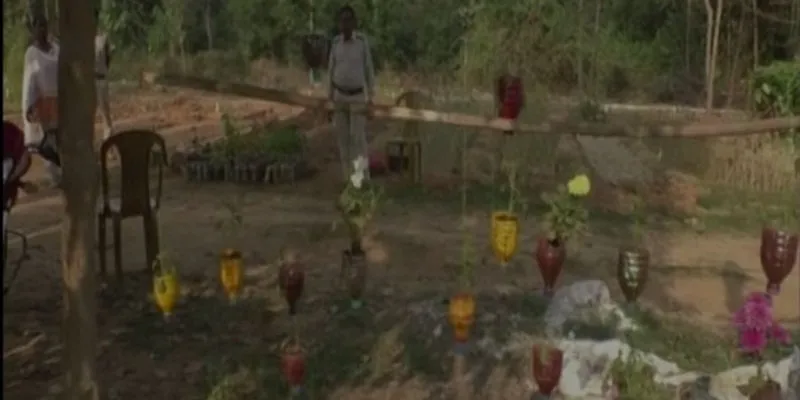This district in Chhattisgarh makes flowerpots from recycled plastic bottles
The nursery in the district also discourages the use of plastic bags, and the women are also required to arrange for discarded plastic bottles to get their daily wages.
Today, oceans have become dumping grounds. From plastics to industrial waste, almost everything is discarded in the ocean causing discomfort to the marine ecosystem.
According to various reports, annually, about eight million metric tonnes of plastic are thrown into the ocean, and by 2050, there would be more plastic in the ocean than fish.
To fight this menace, waste management is put into practice by many governments and individuals, where wastes like plastics are segregated at the source, and recycled after.

The discarded plastic bottle being used as pots (Image: ANI)
And helping out the environment, one plastic bottle at a time is Chhatisgarh’s Ramanujganj district, which uses recycled plastic to make flowerpots. The initiative is led by Pranay Mishra, District Forest Officer, who in a conversation with ANI, said,
“To date, we have managed to prepare about 3,000 flowerpots using old plastic bottles. We plan to sell these plants to generate revenue for women employed in this work. This activity doesn’t require any skilled labour, and the local women are enthusiastically taking part in it. The women are getting employment through it, and we estimate that these plastic containers that are being used for saplings, will last for about two years.”
The nursery, which has been operational since 2016, uses discarded plastic bottles to make flowerpots. Further, it also discourages the use of plastic bags. The nursery asks women to arrange for discarded plastic bottles to get their daily wages, as well.
According to NDTV, the plastic bottles are collected from various parts of the state, which is then made to flowerpots in the nursery. The bottles are first cut, and two holes are later made to pass a wire. Further, cow dung and manure are filled in the bottle and a sapling is planted, Lalan Sinha, Nursery Manager, explained.
“We collect the bottles from nearby cities like Ambikapur and bring them here. The bottles are then cut, and a sapling is planted by filing it with fertile soil. Other parts of the bottle are also fully utilised,” Amarlata Minj, one of the women working at the nursery, told ANI.
(Edited by Suman Singh)
Do you have an interesting story to share? Please write to us at [email protected]. To stay updated with more positive news, please connect with us on Facebook and Twitter.








